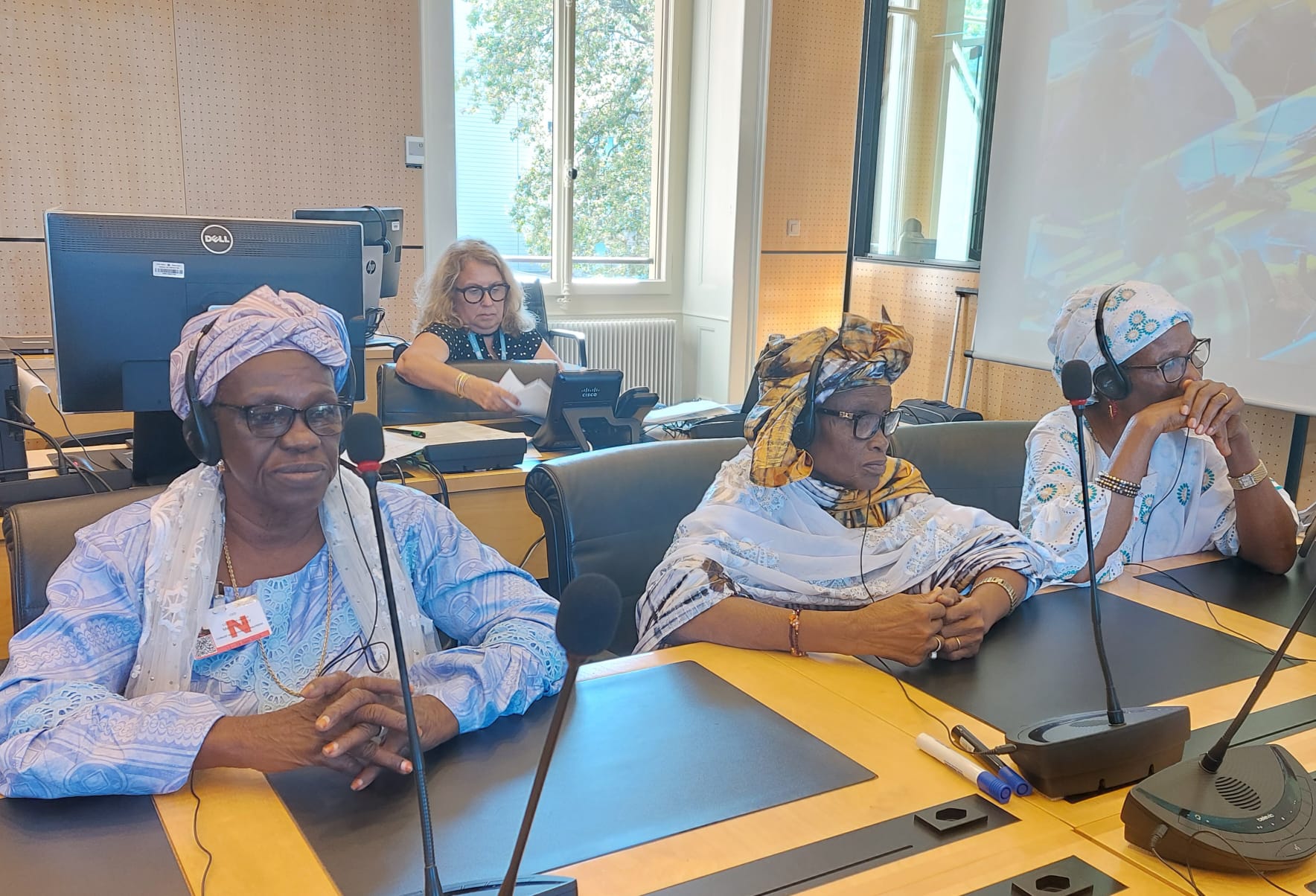October 18, 2023

Relatives of Mauritanian disappeared persons testify before the UN Committee on Enforced Disappearance © Courtesy of Anja Oksalampi.
On September 11 and 12, 2023, the UN Committee on Enforced Disappearances examined in Geneva the efforts made by Mauritania to implement the International Convention for the Protection of All Persons from Enforced Disappearance, ratified by the country in 2012.
The event was an opportunity for Mauritanian civil society involved in transitional justice to be vocal about the Passif Humanitaire, the period during which massive human rights violations were committed against the Afro-Mauritanian population between 1986 and 1992.
Survivors from this period, as well as wives and children of the disappeared, came to Geneva to testify before the Committee. While most of the delegation was made up of activists from the diaspora, three relatives of victims were able to travel from Mauritania thanks to the support of the City of Geneva.
A look back at a dark page in Mauritanian history that remains largely unknown in Europe, and a case that local authorities would like to forget.
A look back at the Passif Humanitaire
In the mid-1980s, there was strong racial discrimination against black communities in Mauritania.
In 1986, several leaders of the Forces de libération africaines de Mauritanie (FLAM), a clandestine opposition movement founded three years earlier, published the “Manifesto of the oppressed Negro-Mauritanian” (Manifeste du Négro-Mauritanien opprimé), in which they described the persecution suffered by "Afro-Mauritanians", a generic term encompassing the black Halpulaar, Soninke and Wolof minorities.
On October 22, 1987, the Mauritanian government claimed that it had discovered and prevented the execution of a coup d'état instigated by around 50 Halpulareen officers, suspected of being members of the FLAM organization that signed the Manifesto.* Following a summary trial before a special court of justice, three of them were sentenced to death on December 3, 1987, and executed three days later.
In 1989, using a cross-border incident as a pretext, the Mauritanian government expelled 60’000 Afro-Mauritanians to Mali and Senegal. Shortly afterwards, between October 1990 and mid-January 1991, the authorities arbitrarily arrested around 3’000 Afro-Mauritanian soldiers. It is estimated that between 500 and 600 of them were subjected to summary executions preceded by torture and incommunicado detention. The repression culminated on November 28, 1990, the anniversary of the country's independence, when 28 soldiers were hanged in the garrison of Inal.
30 years of fighting impunity
In the wake of the Passif Humanitaire, victims and their families collectively organised themselves to claim their rights and carry out advocacy work. Victims’ associations were formed, such as the Collectif des Veuves (Widows’ Collective), in which women played a decisive role.
Two of its representatives, Meimouna Alpha Sy and Fatimata Sall, were present to testify in Geneva before the Committee on Enforced Disappearances. Although their relatives were likely executed in 1990, they have never been able to recover their remains and still do not know where they were buried.
Although victims and their relatives have attempted to initiate proceedings before the Mauritanian courts, the entry into force of Law No. 93-23 on amnesty has dashed their hopes of justice in the Mauritanian courts.
This law, which came into force in 1993, prevents victims and their relatives from accessing effective remedies and establishing responsibility for the violations committed during the period of the Passif Humanitaire. The victims and their families have had no choice but to turn to the supranational courts, with some success.
In 2000, the African Commission on Human and Peoples' Rights (ACHPR) acknowledged that serious human rights violations had been committed between 1989 and 1992, and recommended that the authorities “establish an independent enquiry to clarify the fate of the disappeared persons”, “identify the perpetrators of the violations” and “ensure compensation for the widows and beneficiaries of the victims”.
However, these recommendations have never been implemented. During the presidency of Mohamed Ould Abdel Aziz (2009-2019), the authorities only acknowledged that state agents had committed serious abuses in a vague and general manner. However, they did not take the necessary measures to ensure that the perpetrators of these violations were held accountable.
The issue of impunity arose recently with the election of Mohamed Ould Meguett as President of the National Assembly in June 2023. The opposition and Afro-Mauritanian activists denounced this election highlighting his involvement in the massacres of Afro-Mauritanian soldiers between 1988 and 1991, particularly in Inal. Aissata Tambadou, the daughter of Lieutenant Abdoulaye Tambadou, detailed the newly elected President’s alleged responsibility in her father's execution during a discussion with the Committee on Enforced Disappearances.
What is the role of the Geneva-based human rights protection mechanisms?
Mauritania has ratified the core human rights treaties, such as the International Convention for the Protection of All Persons from Enforced Disappearance.
As such, it is required to submit periodic reports detailing the measures taken to comply with its international commitments. These reports are examined by treaty bodies, committees made up of independent experts who monitor the application of the treaties. These reviews are opportunities for civil societies bring its perspective on certain human rights issues.
On September 11, 2023, organisations such as the Organisation pour le Développement International Social Solidaire Intégré, L'Aide aux Veuves et Orphelins des Militaires Mauritaniens, Muritani Min Njejjittaa and the Cadre de Concertation des Rescapés de Mauritanie (CCR-M) presented their concerns to the Committee on Enforced Disappearances.
Their efforts were successful, as the issue of the Passif Humanitaire was raised at length during discussions between the Committee and representatives of the Mauritanian government on September 11 and 12.
During the interactive dialogue, the Mauritanian delegation claimed to have succeeded in settling the issue by compensating beneficiaries (i.e., relatives of the victims) and organising a day of national reconciliation in Kaédi in 2009.
For its part, the Committee felt that these measures did not seem sufficiently comprehensive, as they did not cover all the types of harm caused by the disappearances. One of its members particularly regretted the emphasis placed on compensation, a measure that could be perceived as a way of closing cases.
Throughout the dialogue, it appeared that the Mauritanian authorities had no intention of instituting comprehensive reparation procedures, including provisions to ensure truth and justice for those concerned.
The Mauritanian government even tried to argue that since the 1993 Amnesty Law predated the adoption of the Convention, the question of its compatibility did not even need to be addressed.
The Committee, in its Concluding Observations published on October 3, did not accept this argument. On the contrary, it recommended that Mauritania “repeal any provision that would have the effect of exempting the perpetrators of enforced disappearances from prosecution or criminal penalties”.
The government is also required to step up its efforts to ensure that all cases of enforced disappearance that occurred during the period of the Passif Humanitaire are thoroughly and impartially investigated. In the event of death, the remains must be identified, handled with respect and returned to the families.
The Mauritanian government has three years to report to the Committee on the implementation of these recommendations, under the watchful eye of a civil society determined to make its voice heard.
* This sentence was modified on October 19, 2023 to correct factual errors contained in the previous version of the article concerning the events of October 1987.






